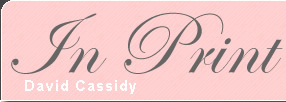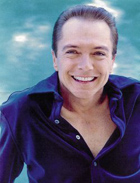
David Cassidy on the Web
Pop Inc.: Manufactured bands more than the sum of their spare parts
July 10, 2009
By Randy Shore
Vancouver Sun
www.vancouversun.com
VANCOUVER - Manufactured pop groups have been around as long as recording studios, often a blend of artists already under contract or known to producers. Perhaps unfortunately for all of us, one of the first (and probably the most cynical) attempt by a record company to "manufacture pop" was successful beyond anyone's wildest dreams. The Monkees out-sold both The Beatles and The Rolling Stones in 1967 and helped unleash on the world a parade of studio-assembled boy- and girl-bands of wildly divergent quality. Mostly fashioned by corporate masterminds, these Frankensteins of popular music deliver just what the buying public wants as evidenced by their spectacular sales figures.
More fun than a barrel of Monkees
Hey, hey they're The Monkees, but they sure look alot like The Beatles. Mike Nesmith, Davy Jones, Micky Dolenz and Peter Tork answered recruitment ads for "four insane boys" placed in Variety and Hollywood Reporter in 1965. As a studio creation, the boys were supplied with a crack team of songwriters and producers and went to work on the TV program based loosely on The Beatles's antics in A Hard Day's Night. The single Last Train to Clarksville was released just before the TV show debuted and rocketed up the charts setting the stage for a the first TV/radio mega-hit. The boys still get together for the occassional tour, though of late with only partial lineups.
I Think I Love You
Led by Keith Partridge (played by uber-cute David Cassidy), The Partridge Family could easily have been a girls-only obsession. But the quality of the accompanying television program, often centred around the scheming of middle son Danny Partridge (played by Danny Bonaduce), vaulted the faux pop group to superstardom. The group and the sit-com were based on the real life family band The Cowsills, who were asked to star in the series, but without their mom Barbara. They said no. Albums sales, TV royalties and licensing fees (C'mon, you had a Partridge Family lunch pail) earned hundreds of millions of dollars for their corporate backers.
I am an Anti-Christ
When Malcolm McLaren met punk wastrel Johnny Rotten he had an idea and made him the frontman for a band he was assembling from spare parts Steve Cook, Rob Jones and Glen Matlock, an art student who ended up writing most of the music. Matlock would soon leave to be replaced by failed art student and punk scenester Sid Vicious, who could not play the bass, but had the right attitude. McLaren had created a mix too volatile to hold together for long, but it lasted long enough for him to sell a crapload of fetishwear to the band's followers from his London boutique.
Tell Me What You Want
The music industry myth-making machine swung into high gear for the Spice Girls, creating character archetypes for each group member: Sporty, Baby, Scary, Posh and Sexy (later Ginger). Boy bands had long used archetypes - the cute one, the funny one, the serious one - to ensure that fans could make an immediate connection to the members, a principle the Spice Girls thoroughly exploited. Recruited with a newspaper advertisement, the Spice Girls quickly rebeled against their management and bolted to Virgin Records and began cranking out hits, fueled by their own brand of Girl Power feminism and total media buy-in. The girls are believed to have grossed $800 million between 1994 and 1998 and have continued to generate huge concert revenues since then.
They got the right stuff
The New Kids were recruited through open auditions in Boston by producer Maurice Starr who wanted to create a Caucasian version of smooth soul group New Edition, which spawned Bobby Brown. The group's first record flopped initially, but Starr came back with a more mature sound for the second album Hangin' Tough and struck gold with five top five singles. After a few heady years as one of the top-earning acts in the world, the Kids were washed away by the rise of Rap in 1994. Most of the orginal lineup reunited last year to produce a new record The Block, which has sold well. NKOTB, as they are now known, have been touring Canada and the United States for nearly a year.
Take That and that and that
Manufactured pop is a truly global phenomenon. The 90s boyband Take That sold 19 million albums and singles worldwide in five years and then broke up due to Robbie Williams's rampant drug abuse. Oddly Williams was launched to superstardom from the ashes of this U.K. assemblage, constructed on the New Kids model. Irish popsters Boyzone produced a string of #1 singles in the 90s. London's Sugababes are among the biggest selling artists since the turn of the millennium and Korea's Sugar had a promising start singing Anime cartoon themes but croaked after trying to grow up their sound. Girls Aloud formed for a reality TV show called Popstars and knocked out 20 U.K. top ten hits in five years.
